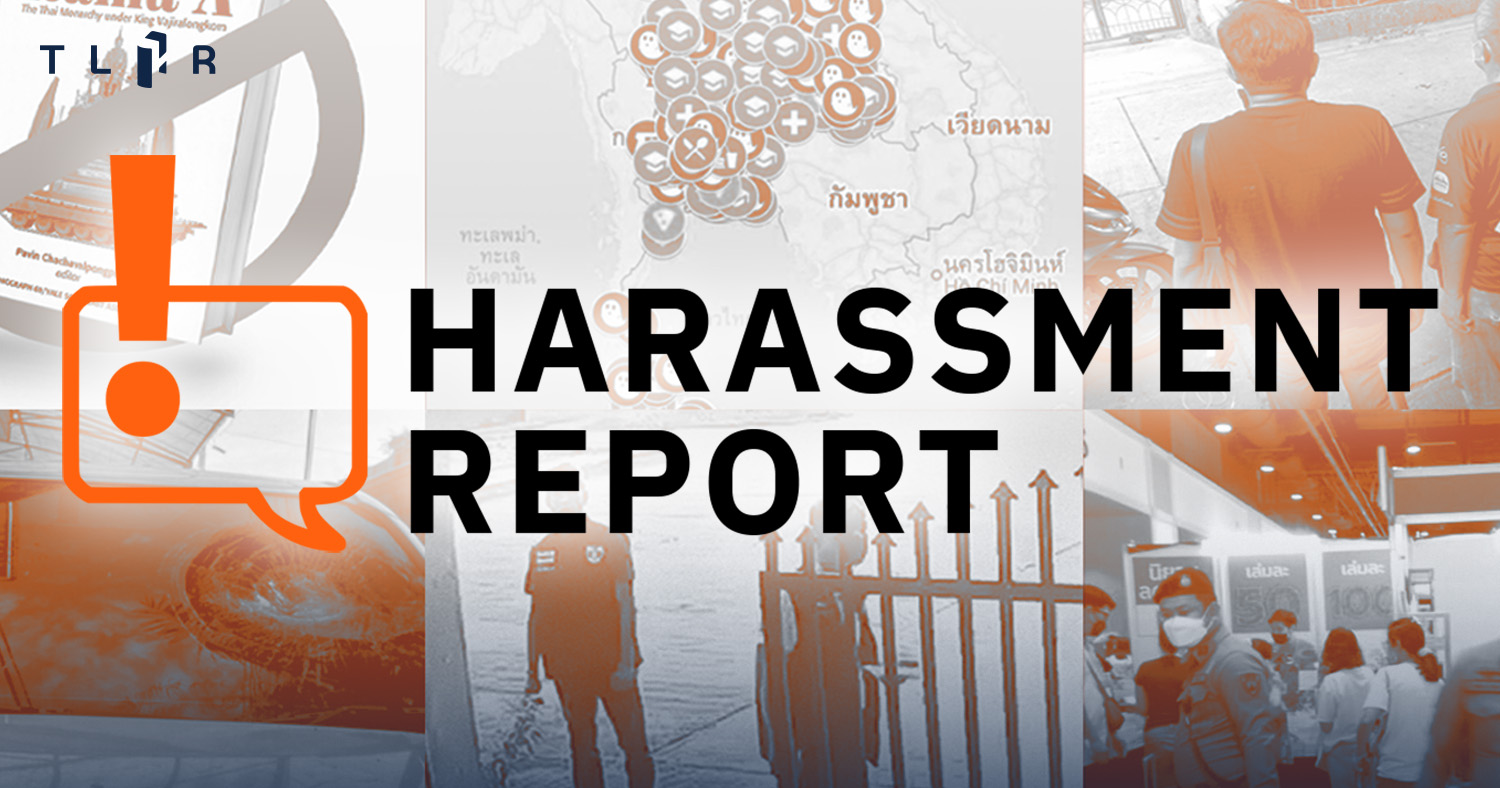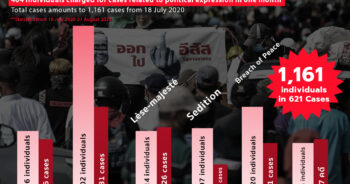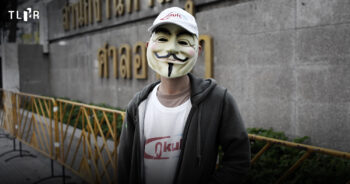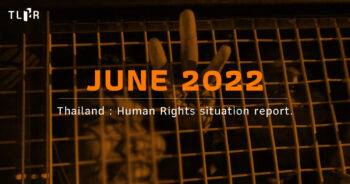Following the election in May 2023, Thailand witnessed a transition from a government led by Gen. Prayuth Chan-ocha to one led by the Pheu Thai Party.
Nevertheless, surveillance and intimidation against activists, students, and politically active citizens by state authorities, extrajudicial measures that have been employed against activists since the NCPO era, remain ongoing. No clear changes to the policy have been observed despite the change in government.
While political protests were few in 2023, the students and citizens who were active during the mass protests of 2020-2022 and subsequently monitored remain targets of house visits and surveillance by authorities, especially when VIPs visit the area. Prohibitions and disruptions of activities were also common occurrences.
As of 23 December 2023, TLHR found that at least 167 individuals in at least 203 instances were subjected to surveillance/intimidation. (some individuals were intimidated/surveilled more than once, resulting in multiple instances in the data). Six children under the age of 18 were among those affected.
70 instances have occurred since Srettha Thavisin was appointed as prime minister on 23 August 2023.
The most common form of intimidation is house or workplace visits (at least 75 instances).
The second most common form is prohibition or disruption of activities (38 instances).
The third most common form is surveillance (36 instances).
The fourth most common form is phone calls to inquire about plans or activities (21 instances).
Our data can be grouped into regions: 98 in central Thailand, 54 in the north, 30 in the northeast, and 17 in the south.
VIP visits were the most common reason for intimidation/surveillance, accounting for more than 78 instances.
The most commonly identified reason for intimidation/surveillance is VIP visits, including visits by royal family members and the prime minister. Before or during these visits, authorities often track down individuals to monitor their movements or disrupt any planned public activity.
There have been at least 78 instances where people were intimidated in such a manner, including 63 instances related to visits of a royal family member or the privy councilor and 15 instances related to visits of the prime minister or a government representative.
This form of harassment/surveillance has occurred in several provinces. In an event of a VIP’s visit, the activists and/or individuals on the authorities’ watchlist were approached at their house or property. More often than not, they were unaware of the visit and had no intention of organizing any political activity or protest in the first place.
Although this “monitoring work” is usually performed by a police division, TLHR has also found instances where police officers received orders or lists of names from military personnel. Two examples of this include “Min” from Bad Students and Mahasarakham University students.
In some cases, the intimidation/surveillance of activists and citizens would occur when a VIP was visiting nearby provinces (TLHR has found that these orders generally came from the provincial police.)
For example, in the event of a royal family member’s visit to Phitsanulok, citizens in Phetchabun, Uttaradit, and Kamphaeng Phet were subjected to intimidation and surveillance. In the event of a royal visit in Tak, former students in Nakhon Sawan who had previously attended protests were monitored. During the King and Queen’s visit in Phuket, police officers called and visited the house of a protester in Surat Thani to verify his plans of visiting Phuket. Some activists in Bangkok who had previously become “targets” of the authorities have also found that their houses were monitored several times in a year in the event of royal visits.
Interestingly, prior to the 2023 election, TLHR found that at least nine citizens were subjected to house visits by the authorities, who would take pictures and inquire about any planned activity when Gen. Prayuth Chan-ocha and Gen. Prawit Wongsuwan made their campaign visits as prime minister candidates. This practice could be seen as the state abusing its power in favor of a political party.
During prime minister Srettha’s provincial visits, police officers were seen monitoring the movements of activists and citizens in Chiang Rai, Ubon Ratchathani, and Chiang Mai by shadowing student leaders and inviting students with a potential to organize public activities to the police station.
At least 53 instances of surveillance/intimidation to restrict political activities.
Individuals who have participated in non-protest forms of public activities and acts of political/societal expressions have also been subjected to surveillance, intimidation, and restriction of political activities. At least 40 instances of this form of harassment have been identified in 2023, in addition to the 13 instances of intimidation related to protests.
The restriction/prohibition of activities has affected many, including a group of students, who distributed school survival manuals in front of the Ministry of Education on the National Children’s Day, and an 18-year-old in Chiang Mai, who wrote “Kids, what do you want to say to adults?” on a banner to invite the public to share their opinions during a children’s day activity organized by Air Force Base 41.
In early 2023, it was reported that the police were putting pressure on the citizens and activists who organized the “Stand-Stop-Detention” protest in Nan for several consecutive days, even though the activity was peaceful and was deemed fine to proceed in other provinces.
At the 2023 National Book Fair, the Samanchonbooks booth displayed the text “Abolish Section 112,” before they were ordered to take it down from an unknown source. Afterwards, the police began periodically patrolling the booths at the fair.
During the post-election period, amidst the Move Forward Party’s attempts to form a government, protests were held to call the Senate to respect the people’s votes. TLHR found that some activists in Bangkok and other provinces were approached by authorities, who then took pictures of them and inquired about their plans, as well as whether they had attended any of the protests.
Activities held during this time were also met with certain restrictions imposed by state authorities. For instance, a group of activists in Chonburi responsible for organizing protests against the senators were subjected to house visits from police officers. In Uttaradit, Move Forward Party supporters were planning a public activity to support Pita Limjaroenrat as the PM candidate but were barred from entering a public venue (that was normally free for the public to access) with padlocks and chains by the Volunteer Defense Corps.
In the past year, we have also found that several activities held by the Move Forward Party, including the election campaign and other post-election member-engagement activities, were closely monitored by authorities. Restrictions on the rights to freedom of expression and peaceful assembly were even seen in a number of instances, such as when the party’s Buriram branch organized a member-engagement activity about local liquors. The organizer was subjected to three house visits by the authorities and even received threats. Moreover, participants of the party’s public activities were often monitored by police officers in plain clothes and had their pictures taken and distributed to the officers’ LINE group (a popular social media app).
In 2023, political activities and expressions in academic spaces remained restricted in many instances. Academic discussions at Naresuan University and Chiang Mai University faced resistance and pressure from royalist groups because activists charged with the lèse-majesté law were participating in them. As a result, the organizers were forced to cancel the event or move the activity out of the campus.
The public discussion organized by the Thammasat Democratic Study Group (TUDS) at Thammasat University’s Rangsit Campus in early September also encountered problems. The Special Branch police approached the university staff, prompting the university to revoke the permission to use one of its rooms and forcing the organizers to make adjustments to the event. At least seven plain-clothed police officers were present at the discussion to observe the activity.
Threats against online expression related to the monarchy were a common occurrence throughout the year.
In 2023, there were at least 20 instances of threats against online expression on the topic of the monarchy, which did not result in lawsuits.
Nine instances concerned house visits by state authorities because posts or texts had been shared with content related to the monarchy. In four other cases, the authorities called the people on the phone to ask for a meeting or to inquire about the published posts or texts.
One case concerns the unlawful arrest of Kant (alias), a student who was arrested and detained for allegedly tweeting about the monarchy. His place of residence was visited by four plain-clothed police officers before he was arrested and detained at the police station for over 2 hours. His communication device was confiscated and a request was made to access his data. He was also asked to sign a document acknowledging that he had published the text and agreeing to never repeat the act. The entire incident took place without an arrest warrant or a document of any kind.
There is the case of “A” (alias), who works in the field of education. A group calling themselves “the Minion Army” (including military personnel) was monitoring her as she had posted comments about the monarchy on Facebook. The group intimidated her by saying that they would not take legal action against her if she signed an MOU for a monarchy-related charity work.
There were also instances involving local government officials affiliated with ISOC (Internal Security Commands). In the beginning of October, a protester in a province in central Thailand revealed that his home was visited by local authorities who claimed that they were acting on police orders to follow up on a post about the monarchy that was shared from Somsak Jeamteerasakul’s Facebook account. He was requested to remove the post.
A post by Tiwakorn Witheeton, who wore a T-shirt with the text “We have lost faith in the monarchy,” alleged that ISOC officers had called his brother to ask him to tone down his Facebook posts.
The harassment, surveillance, and the use of extralegal means, e.g., interrogation or MOU, by the authorities against individuals expressing opinions related to the monarchy, have been reported since 2019, a time in which the enforcement of Section 112 (lèse-majesté) of the Criminal Code was purportedly suspended. However, TLHR found that these practices have continued to 2023, albeit in fewer numbers. It has been difficult to grasp the overall situation of the state using its power in this way, as reports are received on a case-by-case basis. We do not know the full extent in which the actions of the state authorities and the aforementioned group have affected people.
In addition to house visits, the so-called “Minion Army” has also resorted to sending threatening texts from fake accounts to people who post, share, or comment about the monarchy. The texts can be something like “The Minion Army has compiled evidence and is ready to file a lawsuit against you,” with files containing personal data of the said person attached.
This kind of operation has been ongoing since 2021 and continued to be reported in 2023, albeit in diminished volumes (from hundreds of instances in previous years to nine instances in 2023). However, it is possible that not all victims have made reports.
It should be noted that in 2023, the police exercised their power under the Printing Recordation Act B.E. 2550 (2007) to ban the import and distribution of one printed publication in Thailand, namely the book “Rama X: The Thai Monarchy under King Vajiralongkorn” with Pavin Chachavalpongpun as the editor. The ban stemmed from the order of the Commissioner-General and was announced prior to the publication of the book. It alleged that the image on the book’s cover and the articles within reflected the author’s defamatory, insulting, and malicious attitude towards the king.
Intimidation and Use of Violence by Unknown Actors
Apart from intimidation by state authorities, another concerning trend in 2023 is the harassment, intimidation, and the use of violence against activists perpetrated by unknown or obscure actors.
On 14 August 2023, two individuals on a motorcycle without a license plate wearing helmets to obscure their faces stopped near the residence of Tantawan “Tawan” Tuatulanon in the middle of the night and proceeded to throw a large boulder at a car that was parked near inside fence, breaking the windows. The perpetrators are still currently at large.
In the case of Tanruethai “Pim” Taenrat, an activist member of the Mok Luang Rim Nam group, an unidentifiable individual called to intimidate her mother on the phone.
Sam Samat, a stateless activist, was physically assaulted for no clear reasons by a motorbike driver employed by Bolt while he was on his way to Nonthaburi. Sam assumes that the assault stemmed from his opposing political stance since he neither knew the person nor had any prior cause for anger.
In 2024, TLHR will need to closely follow the state’s use of power to monitor and intimidate citizens and activists under Pheu Thai leadership to see if the situation changes and remains the same.
Summary of the situation this year.
Jan-Feb 2023 – at least 30 people have been harassed/intimidated by the state authorities, five of which concern monarchy-related opinions
Mar-Apr 2023 – At least 45 citizens were surveilled and intimidated by state authorities.
During the election period – The overview of the situation regarding the state’s use of power to intimidate and surveil citizens, activists, and MP candidates before the 2023 election.




